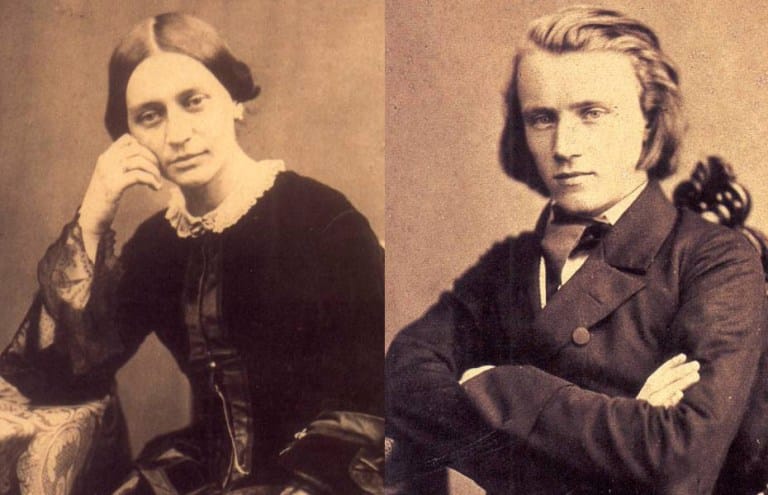The Collaboration of Brahms and Clara Schumann: Music and Friendship

The bond between Johannes Brahms and Clara Schumann is a fascinating story of music, collaboration, and enduring friendship. Despite living in a time when close relationships between male and female composers were not always looked upon favourably, Brahms and Clara Schumann forged a unique and lasting connection. This article explores the nature of their relationship, how it influenced their music, and what their friendship meant to each of them personally and professionally.
The Meeting of Brahms and Clara Schumann
Johannes Brahms met Clara Schumann in 1853, through their mutual friend Robert Schumann, Clara’s husband. At the time, Brahms was a young composer in his twenties, while Clara was a highly respected pianist and composer, with a career spanning decades. Robert Schumann, a composer and music critic, quickly recognized Brahms’s talent and invited him to their home in Düsseldorf.
During this first meeting, Brahms played his compositions for the Schumanns, who were impressed by his skill and innovation. A strong connection developed between Brahms and the Schumann family, particularly with Clara, whose musical knowledge and experience complemented Brahms’s youthful enthusiasm and creativity.
Mutual Respect and Admiration
The relationship between Brahms and Clara Schumann was built on mutual respect and admiration. Clara, an accomplished pianist and composer in her own right, saw great potential in Brahms’s work. She was instrumental in introducing his music to the public, often including his pieces in her concerts and promoting his compositions to publishers and fellow musicians.
Brahms, in turn, admired Clara’s musicianship and valued her opinion. He often sought her feedback on his compositions, and her guidance played a significant role in shaping his musical style. Their extensive correspondence reveals the depth of their discussions about music and life, with Brahms often expressing his gratitude for Clara’s insights.
Collaborative Works and Influences
Brahms and Clara Schumann’s collaboration extended beyond their personal relationship. Clara frequently performed Brahms’s music, helping to establish his reputation in the classical music world. Her interpretations of his works were widely praised, and her support was crucial to his success during the early years of his career.
Brahms was also influenced by Clara’s compositions and performances. He dedicated several pieces to her, including his Piano Concerto No. 1 in D minor and Variations on a Theme by Robert Schumann, Op. 23. These dedications reflect the deep connection they shared and the inspiration Brahms drew from Clara’s artistry.
Personal Support and Emotional Connections
Beyond their musical collaboration, Brahms and Clara Schumann shared a profound personal bond. This connection deepened after the death of Robert Schumann in 1856, which left Clara a widow with several children to care for. Brahms became a source of emotional support for Clara during this difficult time, often visiting her and providing assistance in various ways.
Their relationship, however, was not without its complexities. Brahms’s feelings for Clara were strong, but the nature of their relationship remained ambiguous. While some historians speculate that there may have been romantic elements, both Brahms and Clara were careful to maintain a boundary in their public interactions. This ambiguity has sparked considerable debate among scholars, but the friendship and support they shared are undeniable.
Legacy and Impact
The collaboration between Brahms and Clara Schumann had a lasting impact on the classical music community. Clara’s championing of Brahms’s work helped establish his place among the great composers of the 19th century. Her performances of his music contributed to his popularity, and her feedback influenced the development of his style.
Brahms’s friendship with Clara Schumann also had a profound effect on his personal life. Despite his growing fame, he remained loyal to Clara, often referring to her as his closest friend. This loyalty extended throughout their lives, with Brahms visiting Clara in her final years and supporting her until her passing in 1896.
Conclusion
The collaboration and friendship between Brahms and Clara Schumann remain a compelling story in the history of classical music. Their relationship was built on mutual respect, admiration, and a shared passion for music. While the exact nature of their connection may remain open to interpretation, the impact they had on each other’s lives and careers is clear.
Through their collaboration, Brahms and Clara Schumann demonstrated the power of friendship and artistic partnership in a time when such relationships were not always common. Their story serves as a reminder that music has the unique ability to bring people together and create enduring bonds that transcend societal expectations.





